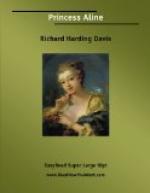“Carlton is probably the only living artist,” a brother artist had said of him, “who fails to appreciate how great his work is.” And on this being repeated to Carlton by a good-natured friend, he had replied cheerfully, “Well, I’m sorry, but it is certainly better to be the only one who doesn’t appreciate it than to be the only one who does.”
He had never understood why such a responsibility had been intrusted to him. It was, as he expressed it, not at all in his line, and young girls who sought to sit at the feet of the master found him making love to them in the most charming manner in the world, as though he were not entitled to all the rapturous admiration of their very young hearts, but had to sue for it like any ordinary mortal. Carlton always felt as though some day some one would surely come along and say: “Look here, young man, this talent doesn’t belong to you; it’s mine. What do you mean by pretending that such an idle good-natured youth as yourself is entitled to such a gift of genius?” He felt that he was keeping it in trust, as it were; that it had been changed at birth, and that the proper guardian would eventually relieve him of his treasure.
Personally Carlton was of the opinion that he should have been born in the active days of knights-errant—to have had nothing more serious to do than to ride abroad with a blue ribbon fastened to the point of his lance, and with the spirit to unhorse any one who objected to its color, or to the claims of superiority of the noble lady who had tied it there. There was not, in his opinion, at the present day any sufficiently pronounced method of declaring admiration for the many lovely women this world contained. A proposal of marriage he considered to be a mean and clumsy substitute for the older way, and was uncomplimentary to the many other women left unasked, and marriage itself required much more constancy than he could give. He had a most romantic and old-fashioned ideal of women as a class, and from the age of fourteen had been a devotee of hundreds of them as individuals; and though in that time his ideal had received several severe shocks, he still believed that the “not impossible she” existed somewhere, and his conscientious efforts to find out whether every women he met might not be that one had led him not unnaturally into many difficulties.
“The trouble with me is,” he said, “that I care too much to make Platonic friendship possible, and don’t care enough to marry any particular woman—that is, of course, supposing that any particular one would be so little particular as to be willing to marry me. How embarrassing it would be, now,” he argued, “if, when you were turning away from the chancel after the ceremony, you should look at one of the bridesmaids and see the woman whom you really should have married! How distressing that would be! You couldn’t very well stop and say: `I am very sorry, my dear, but it seems I have made a mistake. That young woman on the right has a most interesting and beautiful face. I am very much afraid that she is the one.’ It would be too late then; while now, in my free state, I can continue my, search without any sense of responsibility.”




